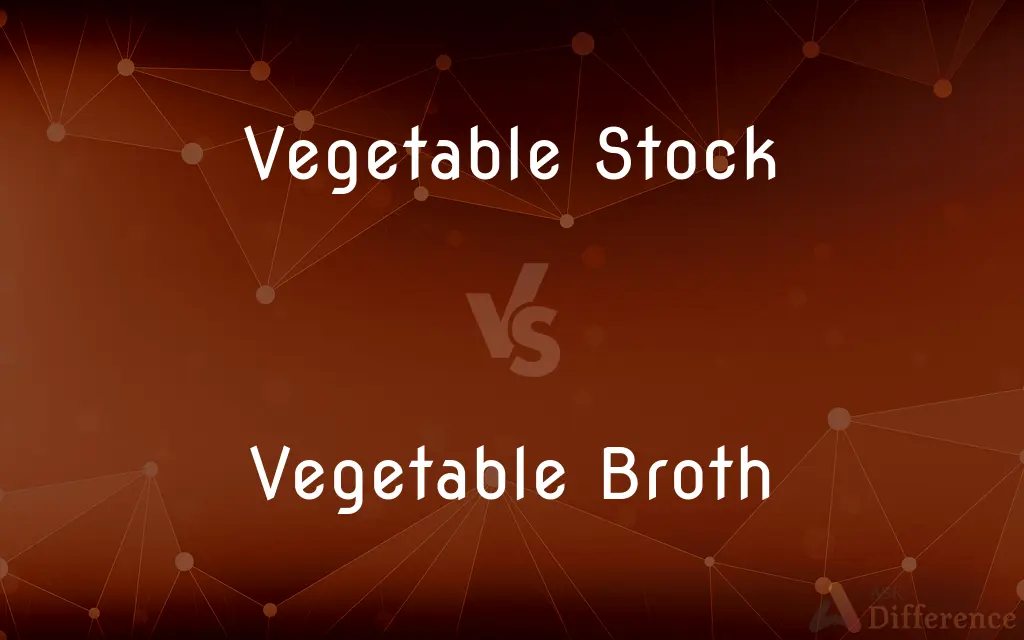Vegetable Stock vs. Vegetable Broth — What's the Difference?
By Tayyaba Rehman — Published on December 13, 2023
Vegetable Stock is made by simmering vegetables and possibly herbs for flavor. Vegetable Broth is seasoned, can be sipped alone or used as a base. Both are liquid infusions but differ in depth and purpose.

Difference Between Vegetable Stock and Vegetable Broth
Table of Contents
ADVERTISEMENT
Key Differences
Vegetable Stock is a liquid resulting from simmering vegetables, and sometimes herbs, in water. The primary purpose is to extract flavors and nutrients. Vegetable Broth, conversely, is not just about extraction but is seasoned and often more flavorful, making it suitable to be consumed directly.
The main difference between Vegetable Stock and Vegetable Broth lies in their intended uses. Vegetable Stock acts as a foundation in various dishes, while Vegetable Broth, due to its seasoning, can stand alone as a light soup or be used as a base in more complex soups and stews.
Typically, Vegetable Stock has a more muted flavor since it's meant to be neutral, allowing it to be versatile in culinary applications. In contrast, Vegetable Broth often has a more robust flavor profile, as it's meant to be appetizing on its own.
Preparation-wise, Vegetable Stock might be simmered for longer periods to extract as much flavor as possible from its components. However, Vegetable Broth is generally cooked for a shorter duration after which seasonings are added to enhance its taste.
It's worth noting that Vegetable Stock typically doesn't contain salt, or if it does, it's minimal. Vegetable Broth, on the other hand, is salted, sometimes containing other seasonings like bay leaves, peppercorns, or even sugar, to enhance its taste.
ADVERTISEMENT
Comparison Chart
Purpose
Foundation for dishes.
Consumed directly or as soup base.
Flavor Profile
Neutral, muted.
Seasoned, robust.
Duration of Cooking
Longer for flavor extraction.
Shorter with added seasonings.
Salt Content
Minimal or none.
Contains salt and other seasonings.
Consumption
Typically not sipped alone.
Can be sipped alone.
Compare with Definitions
Vegetable Stock
Neutral-flavored infusion from vegetable simmering.
I replaced water with vegetable stock to cook my quinoa.
Vegetable Broth
Directly consumable seasoned vegetable liquid.
On cold days, a cup of vegetable broth warms me up.
Vegetable Stock
Flavor extract from vegetables and herbs in water.
Using fresh vegetable stock can elevate the taste of your dish.
Vegetable Broth
Vegetable-based liquid with added seasonings.
I used vegetable broth instead of water for a flavorful stir-fry.
Vegetable Stock
A liquid infusion made by simmering vegetables.
I made vegetable stock as a base for my risotto.
Vegetable Broth
Flavored soup base derived from vegetables.
The vegetable broth added depth to my noodle soup.
Vegetable Stock
Foundation for soups, sauces, and other dishes.
A good vegetable stock is the secret to a rich gravy.
Vegetable Broth
Seasoned liquid made from simmered vegetables.
I sipped warm vegetable broth to soothe my throat.
Vegetable Stock
Unseasoned vegetable-derived liquid.
I froze the leftover vegetable stock for future use.
Vegetable Broth
Soup-like liquid with robust vegetable flavorings.
The vegetable broth was so rich, it needed no further additions.
Common Curiosities
What's the key difference between Vegetable Stock and Vegetable Broth?
Vegetable Stock is a neutral base, while Vegetable Broth is seasoned and can be consumed directly.
Can I make Vegetable Stock from vegetable scraps?
Absolutely! Vegetable Stock often uses scraps like peels and ends.
Can I use Vegetable Broth in place of Vegetable Stock in recipes?
Yes, but adjust for salt and seasoning as Vegetable Broth is already seasoned.
Is Vegetable Broth essentially seasoned Vegetable Stock?
Essentially, yes. Vegetable Broth is like a Vegetable Stock that's seasoned for direct consumption.
Are Vegetable Stock and Bone Stock the same?
No. While Vegetable Stock is plant-based, Bone Stock is made from simmering animal bones.
How long should I simmer vegetables for Vegetable Stock?
Typically longer than for Vegetable Broth, to extract maximum flavor.
Are there commercial versions of both available?
Yes, both Vegetable Stock and Vegetable Broth are available in stores, though reading labels for additives is advisable.
If I don't have Vegetable Broth, can I season Vegetable Stock and use it?
Yes, adding seasonings to Vegetable Stock can make it similar to Vegetable Broth.
Which one is saltier, Vegetable Stock or Vegetable Broth?
Vegetable Broth, as it's seasoned, while Vegetable Stock typically has minimal or no salt.
Can I use either for vegan recipes?
Yes, both are typically vegan unless specified otherwise.
How should I store leftover Vegetable Stock or Broth?
Both can be refrigerated for a short term or frozen for longer storage.
Which one is more versatile in cooking?
Vegetable Stock, due to its neutral flavor, can be used in more varied dishes.
Which one is healthier?
Both can be healthy, but watch for sodium content in commercial Vegetable Broth.
Is it cheaper to make Vegetable Stock or Broth at home?
Often, yes. Especially if using vegetable scraps for Vegetable Stock.
Can I add meat to Vegetable Broth?
Yes, but then it would no longer be a purely Vegetable Broth.
Share Your Discovery

Previous Comparison
Alkanes vs. Alkenes
Next Comparison
Muppets vs. PuppetsAuthor Spotlight
Written by
Tayyaba RehmanTayyaba Rehman is a distinguished writer, currently serving as a primary contributor to askdifference.com. As a researcher in semantics and etymology, Tayyaba's passion for the complexity of languages and their distinctions has found a perfect home on the platform. Tayyaba delves into the intricacies of language, distinguishing between commonly confused words and phrases, thereby providing clarity for readers worldwide.












































